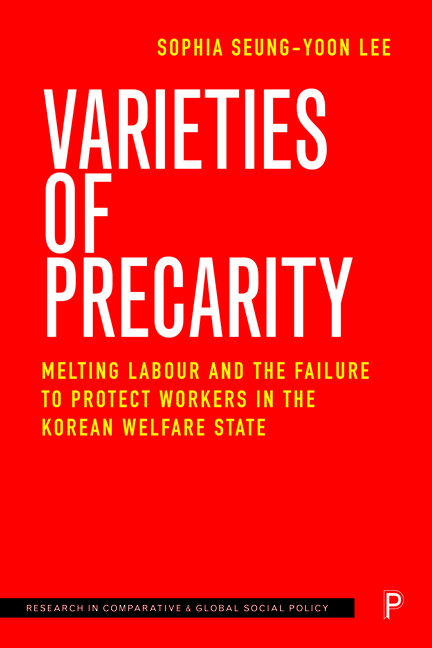 Varieties of Precarity
Varieties of Precarity Book contents
- Frontmatter
- Contents
- Series editors’ preface
- List of figures and tables
- Acknowledgements
- 1 Introduction: Melting labour and institutional inconsistency
- 2 Social protection policies and the South Korean labour market in comparative perspective
- 3 When insiders are kicked out: layoffs of regular workers in manufacturing
- 4 Same boat, different destiny: subcontracted workers in the Korean shipbuilding industry
- 5 Young and old outsourced female workers in call centres and cleaning services
- 6 Are freelancers really free? The Korean freelance labour market and the precarity of young freelancers
- 7 The digital precariat: various Korean platform workers and the new work logic
- 8 Conclusion: Towards universal institutional protection for precarious workers in the era of melting labour
- Notes
- References
- Index
Series editors’ preface
Published online by Cambridge University Press: 03 April 2024
- Frontmatter
- Contents
- Series editors’ preface
- List of figures and tables
- Acknowledgements
- 1 Introduction: Melting labour and institutional inconsistency
- 2 Social protection policies and the South Korean labour market in comparative perspective
- 3 When insiders are kicked out: layoffs of regular workers in manufacturing
- 4 Same boat, different destiny: subcontracted workers in the Korean shipbuilding industry
- 5 Young and old outsourced female workers in call centres and cleaning services
- 6 Are freelancers really free? The Korean freelance labour market and the precarity of young freelancers
- 7 The digital precariat: various Korean platform workers and the new work logic
- 8 Conclusion: Towards universal institutional protection for precarious workers in the era of melting labour
- Notes
- References
- Index
Summary
In a world that is rapidly changing, increasingly connected and uncertain, there is a need to develop a shared applied policy analysis of welfare regimes around the globe. Research in Comparative and Global Social Policy is a series of books that addresses broad questions around how nation states and transnational policy actors manage globally shared challenges. In so doing, the book series includes a wide array of contributions, which discuss comparative social policy history, development and reform within a broad international context. The book series invites innovative research by leading experts on all world regions and global social policy actors and aims to fulfil the following objectives: it encourages cross-disciplinary approaches that develop theoretical frameworks reaching across individual world regions and global actors; it seeks to provide evidence-based good practice examples that cross the bridge between academic research and practice; not least, it aims to provide a platform in which a wide range of innovative methodological approaches, be it national case studies, larger-N comparative studies or global social policy studies, can be introduced to aid the evaluation, design and implementation of future social policies.
In this regard, we are delighted to have Sophia Seung-yoon Lee’s contribution on precarious labour in Korea as a part of our book series. This book brings together a unique collection of case studies of different scenarios of labour market preciousness or fissured workplaces in Korea. This includes Ssangyong Motor Industry plant workers, call centre cleaning workers, to Korean platform workers. Together they tell the story of the rise of precarious and ‘melting labour’ in Korea and the failures of their welfare state development in protecting workers.
The highlight of this book is its unique and innovative theoretical contribution of the concept of ‘melting labour’. Melting labour entails the dismantling of various boundaries surrounding traditional forms of work and workplace – namely the rise of non-regular and atypical work, subcontracted and outsourced work and bogus self-employment like dependent or disguised self-employed individuals, freelancers and platform workers. Through the use of the concept, Lee aims to provide a better conceptualisation of the increased new forms of work that deviate away from standard employment, and better understand the common features of changes in work and workplace forms that enable this.
- Type
- Chapter
- Information
- Varieties of PrecarityMelting Labour and the Failure to Protect Workers in the Korean Welfare State, pp. vi - viiPublisher: Bristol University PressPrint publication year: 2023
